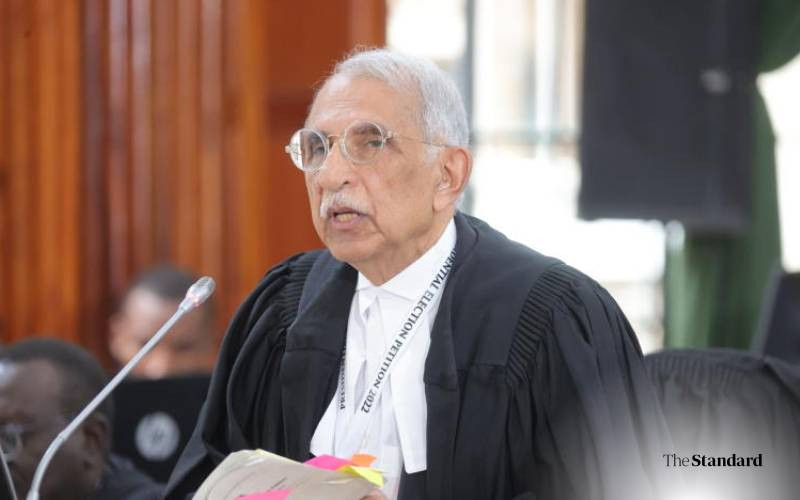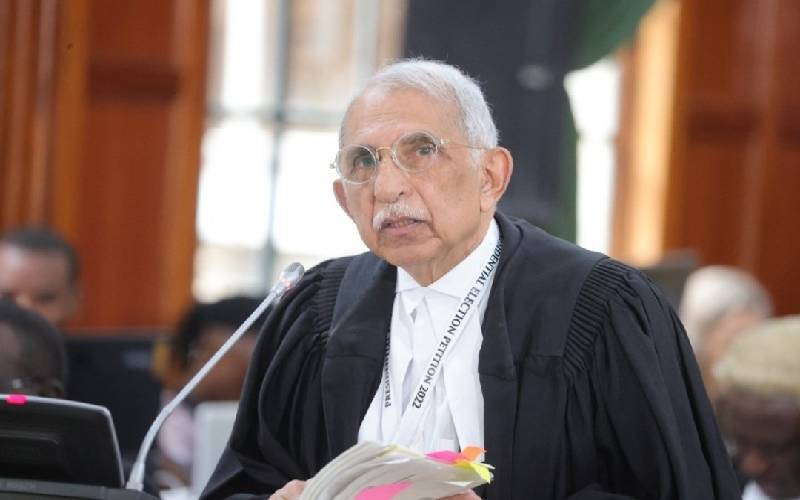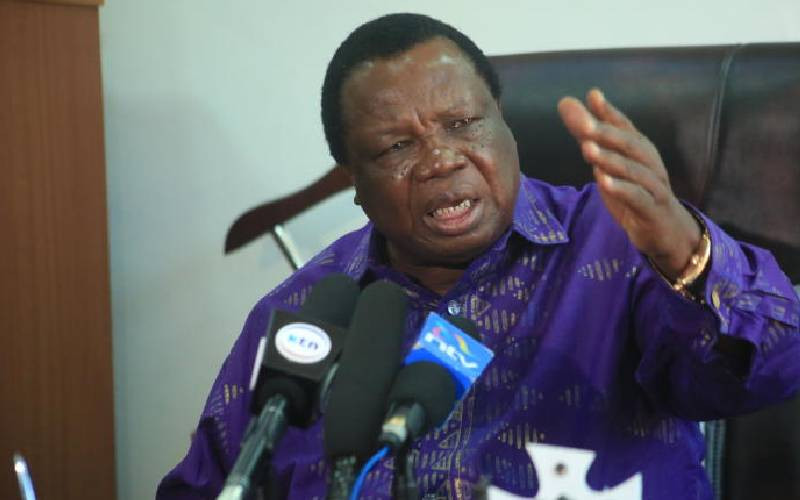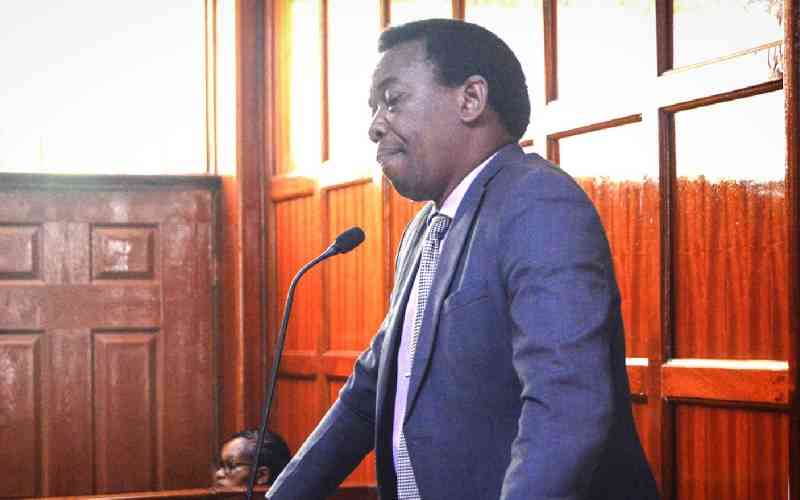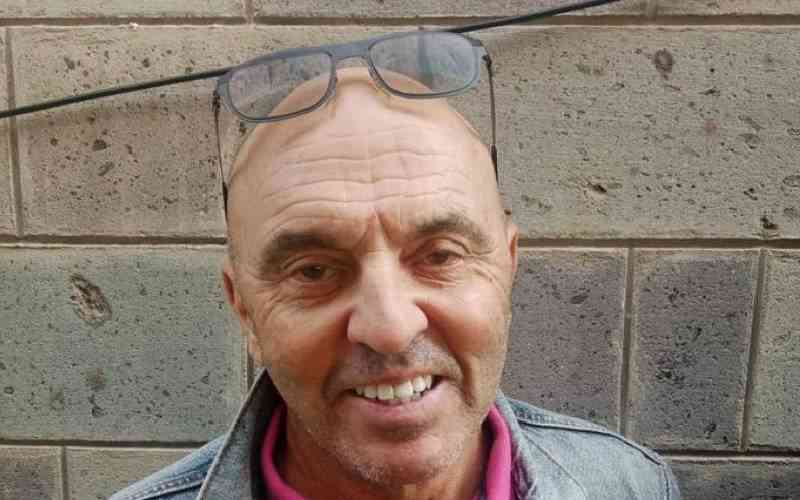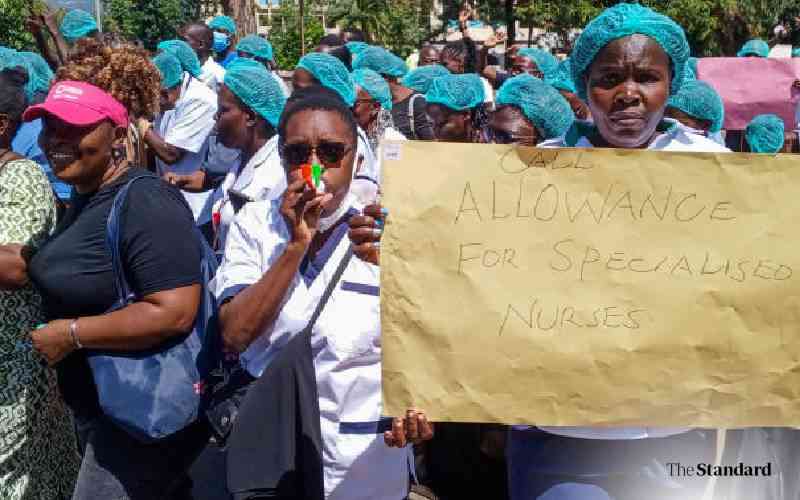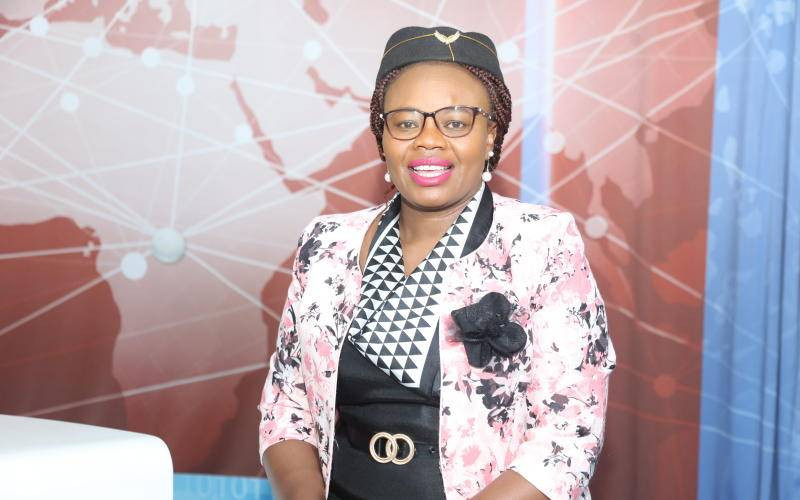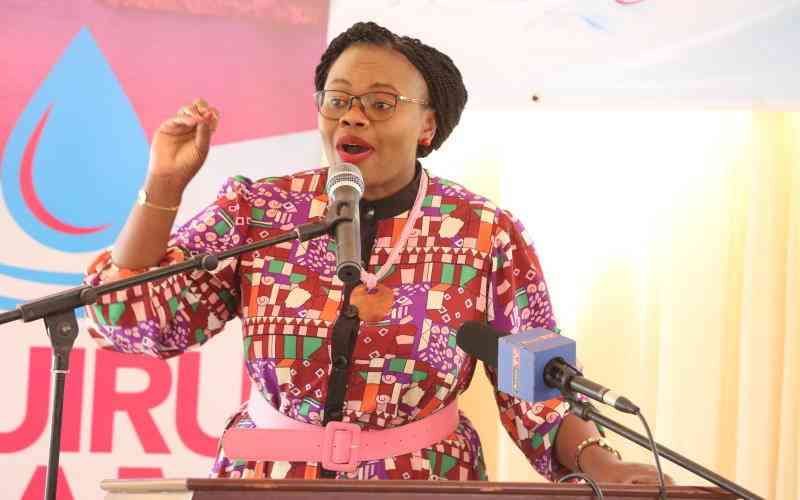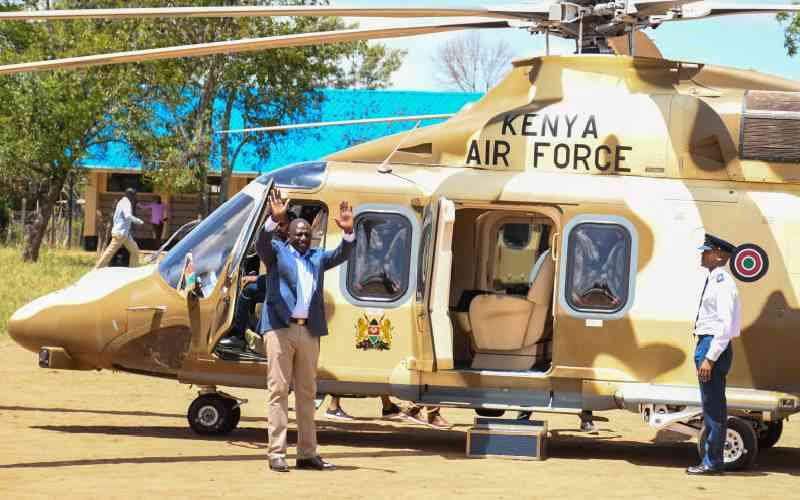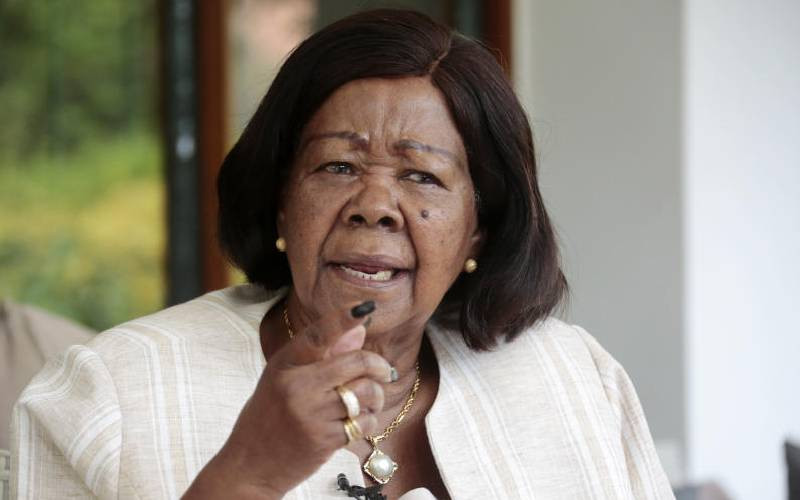
Kenya Defence Forces (KDF) soldiers, who braved bullets, explosions, and ambushes and got injured in battle are now standing alone — abandoned — after suffering injuries on the frontline.
More than 350 KDF personnel, once among the 4,000 who braved the battlegrounds of Somalia — risking their lives and future for their country — now find themselves forgotten. Sinking deeper into despair dying, they feel forsaken by the institution they trusted for protection and served with zeal, even as they once raised the Kenyan flag high.
The Saturday Standard met and spoke to seven injured servicemen and families of five others now tending to their once strong but now broken sons. Aware of strict military codes that guide their professional life and even after service, we have decided not to reveal their names and their families
We also came across documents that are now in our possession, that paint a grim reality — the government, once dependent on their courage, has turned its back, leaving them to wrestle with frustration, pain, poverty, and the slow creep of death.
An exchange of e-mails and letters between officers and service personnel across various commands and departments within KDF reveal that the Department of Defence admits that no assistance has been provided after the government mysteriously terminated a private compensation scheme in 2015.
The servicemen The Saturday Standard spoke to, some bedridden and others disabled, explained their pain to their bosses in letters seen by The Standard, which we cannot publish to protect their identity.
“You are kindly requested to inform all those under your command that DHQ (Defence Headquarters) is in the process of verifying the cases that were taken over from defunct insurance companies before commencement of the KDF compensation scheme to allow strategic guidance by the defence council,” a document in our possession stated, adding, “this HQ continues to receive enquiries from service personnel concerning the compensation of GPA (injury cases).”
When we reached out to the Ministry of Defence via e-mail, they replied by asking which department should handle our queries. However, when we directed our questions to the Cabinet Secretary and the communications department, they went silent. Similarly, multiple calls and messages to the Kenya Defence Forces (KDF) went unanswered.
The service personnel were part of the KDF team deployed to Somalia during Operation Linda Nchi, launched on October 14, 2011, to counter al-Shabaab’s cross-border attacks and kidnappings. Though kidnappings were cited as the trigger, planning reportedly began in 2010 with US support.
Kenyan forces, alongside Somali allies, captured key towns before integrating into African Union Mission in Somalia (Amisom) in 2012.
“This decision was reached after a series of border attacks and incursions by the militia group (al-Shabaab) along the common border with Somalia, where Kenyan aid workers in Dadaab, a couple in Kiwayu Safari Village in Lamu, and a French tourist were abducted,” reads part of an excerpt from The Soldier’s Legacy – The Kenya Army at 55, a document dedicated to past, present, and future Kenya Army personnel.
KDF says that they later led operations in Lower and Middle Juba, seizing Kismayo in September 2012 — a move that significantly disrupted al-Shabaab’s revenue from the port.
“The fall of Kismayo to Amisom troops was a classic case of deception that surprised al-Shabaab, thereby leaving the terrorist group with no alternative but to abandon the city so as to avert complete destruction,” reads the book.
While the intervention weakened the militant group, it came at a cost: an unknown number of casualties and multiple injuries, including among Kenyan troops who survived gunshots, ambushes, improvised explosive device (IED) attacks, and bomb blasts — losing limbs, eyesight, and hearing, with some paying the ultimate price—to keep 50 million Kenyans back home safe.
“It is not easy fighting an enemy in his home, which was Somalia,“ said a serviceman who is now frail, fragile and with tears rolling down his face, “I am broke because I went to be treated in a private hospital. And I went there because I wanted specialised treatment.”
Despite significant gains, al-Shabaab retains rural strongholds and continues to launch attacks inside Kenya. The military’s presence in Somalia under African Union Transition Mission in Somalia (ATMIS) was set to end by late 2024, but discussions continue on whether to maintain a security footprint given Somalia’s fragile stability.
In October 2023, Kenya announced it would withdraw all its troops from Somalia by December 2024, the then Defence Cabinet Secretary Aden Duale (now Environment CS) said.
“The last troops are expected to leave Somalia on December 31, 2024, as per the AU (African Union) and UN Security Council resolution and plan,” Duale told the Senate.
For the wounded soldiers, the war never truly ended. Their medals — symbols of valour — are the only recognition they have. A number returned with missing limbs, their bodies patched together with metal rods and skin grafts. Others suffer from shattered spines, hearing loss from deafening blasts, or blindness from gunfire flashes. But their deepest wound is the silence - the government’s refusal to acknowledge their suffering.
“We were victims of IEDs and other attacks. But now we are suffering, and the whole process to help us within the military is frustrating,” said a serviceman, who also said he was saved by colleagues from depression.
Some of these heroes now live in slums, their gallantry reduced to rusting medals, struggling for their next meal.
Other soldiers report being retired early instead of being given alternative career paths within the KDF to serve the country and people they took an oath to serve.
“Many injured soldiers are being reassigned to non-combat roles but are rarely considered for leadership or administrative promotions despite their experience,” they told The Saturday Standard.
Depression haunts them, they say, a shadow of broken promises, as the country they defended moves on, leaving them behind.
“I can’t work because of my injuries, and that means I’m considered absent. I’m still young, but my life gets harder every day,” another injured soldier told The Saturday Standard.
The soldiers said the injured officers were not treated well within the KDF ranks, especially the disabled ones, particularly in career progression, compensation, and basic welfare.
“It is very sad that those who made wrong decisions that left some of us injured are the ones being promoted easily, while we are forced to look for treatment and raise funds for treatment, live in slums. Most decisions were made in Nairobi, including deploying aircraft to save us; yet, we have commanders in Somalia,” a service officer said, surrounded by the family.
The officer said that some still serve in pain while others have retired or died waiting for help that never came.
“Career stagnation is a major issue for wounded soldiers. When injured, it is very hard to be promoted,” he said.
The officers said that many have been reassigned to non-combat roles but rarely considered for promotions, leaving them with no hope of growing in their careers.
They said that despite their service and experience, they often find themselves sidelined.
“Military doctors treat us like soldiers in war, yet some of us have life-threatening injuries,” one officer said. “Worse, the KDF hospital is not equipped. That’s why we are forced to go to private hospitals where we have to pay.”
Another officer, injured in Somalia, said, “Many of us were wounded by IEDs or gunfire. Worse, some are dying while seeking help. The private insurance scheme that was supposed to assist us was mysteriously terminated in 2015.”
Instead, they are now under a frustrating military medical scheme. “The officers in charge are slow and unresponsive. They keep frustrating us,” he added.
People With Disabilities (PWD) in KDF say the military also lacks clear policies for integrating disabled personnel into meaningful roles. Many injured officers face stigma, treated as a burden rather than honoured service members. Some are pushed out of the force instead of being given alternative career paths within the KDF.
They added that housing inequality is another pressing concern as they struggle to pay bills.
“Some of our people lost eyesight or hearing.
‘‘They can’t do much and are forced to live in informal settlements. We have houses in barracks, but our bosses have occupied them,” one of the officers living in Eastlands said.
He added that while commanders live in well-maintained homes within KDF compounds, many disabled soldiers struggle to afford rent in dilapidated estates.
Mental health support remains inadequate. “Many of these soldiers suffer from post-traumatic stress disorder (PTSD) and other psychological conditions, yet they have little or no access to counselling or rehabilitation programmes,” an officer said. “Without proper mental health services, the burden of their trauma continues to weigh heavily on them.”
The slow and often unfair compensation process compounds their struggles. Many injured soldiers wait years for financial support, with some never receiving what they are owed. Bureaucratic red tape and delays have worsened their plight.
“Soldiers who acquired disabilities while in service often find their careers stagnating with fewer opportunities for promotion compared to their able-bodied counterparts during promotion evaluation,” a source at the Department of Defence explained, adding, “Although they appreciate the KDF leadership for awarding them medals like the Silver Star and Order of the Grand Warrior (OGW) and also for exempting them from income tax, soldiers living with disabilities feel more needs to be done on their career progression and general welfare.”
The KDF leadership has awarded these soldiers medals like the Silver Star and OGW and exempted them from income tax, but these gestures mean little without concrete action.
The officers are calling for the Defence Council, Chief of Defence Forces, service commanders, and the Chief of Welfare and Compensation at Defence Headquarters to act and save them through compensation, treatment, promotions, and guiding and counselling.
“Although they appreciate the KDF leadership for awarding them medals like the Silver Star and OGW and also for exempting them from income tax, soldiers living with disabilities feel more needs to be done on their career progression and general welfare,” an officer told The Saturday Standard.
 The Standard Group Plc is a multi-media organization with investments in media platforms spanning newspaper print
operations, television, radio broadcasting, digital and online services. The Standard Group is recognized as a
leading multi-media house in Kenya with a key influence in matters of national and international interest.
The Standard Group Plc is a multi-media organization with investments in media platforms spanning newspaper print
operations, television, radio broadcasting, digital and online services. The Standard Group is recognized as a
leading multi-media house in Kenya with a key influence in matters of national and international interest.

